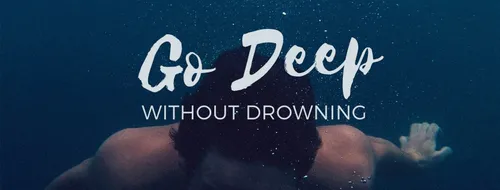GO DEEP without DROWNING | In-house Training
- Friday 1 January 2027
- 9:00 am - 4:00 pm
- Your Location
| CPD Hrs | 14 |
|---|---|
| Includes | Handbook and certificate |
Relational Trauma: Beyond Burn Out and Self-Care
Relational trauma requires relational repair. Working with clients with relational trauma can impact on practitioners in many ways. The nature of your work requires you to go deep with clients;
- suddenly in the split-second of your client’s heated emotions/ aggression,
- desperately when advocating for your client's needs,
- and still other more candid times when your client reveals a part of them, that their shame rarely allows them to share.
But at what cost to you?
Relational trauma begins early in life. Trust in the inner world of sensations and emotions develops from safe and consistent caregiver responses that reflect and enliven what is happening inside. However, when these responses miss the mark repeatedly, this can make normal experiences feel unsafe, intolerable and untrustworthy. Under these conditions, people can start to feel like they are unlovable and alien. People we work with who have survived relational trauma can often feel this way when they are relating to others, meaning that they can may struggle to trust, and be rejecting of our efforts to engage.
Whilst stories of survival and resilience can inspire us, it is the daily (often unrecognised) exposure to traumatic material and clients coping behaviours which results in gradual and insidious changes in the internal states and world views of practitioners. This can leave practitioners feeling powerless to achieve change or feeling like we are part of systems that perpetuate injustice for already vulnerable people. Making it extremely challenging to sustain hope and effective practice. Good practitioners seek to go deep with clients because they know that is where the healing starts. But to do that, you’ve go to be willing to learn how to use and practice therapeutic care with yourself (and your peers/ staff). This workshop is for team leaders concerned about staff wellbeing through to new graduates wanting to fortify themselves for a long and meaningful career, and all of us in between who have asked ourselves… “why am I doing this?”.
Through reflective and experiential learning, this workshop aims to provide new knowledge and tools to help sustain and grow practice with our most vulnerable clients, and in a way that integrates individual, team and organisational levels of practice.
DAY ONE
We will focus on and go deep into both our client’s experiences, and our own when we are doing our trauma related work.
Testing The Water
What have our clients experienced and what is the impact of these experiences?
- Introductions/group agreement
- Adverse childhood experiences (ACE’s)
- Complex Developmental Trauma and what it means in a relational sense
- Trauma Exposure
- What is happening in the brain and Autonomic Nervous System when under threat?
- Relationship and attachment
Wading In
What is it like for us to engage with clients with complex traumatic histories?
What drives us and our responses? How can we increase our awareness and skill levels in order to be most effective in our practice?
- The Therapeutic Relationship: responding to trauma-related behaviours .
- Theory and practice
- Co-regulation
- Mentalization
Going Deep
What is happening for them and for us? What drives the behaviour we see and do, and why?
- Empathy and compassion
- A mindfulness-based approach
- Staying warm at subzero temperatures – maintaining boundaries while maintaining warmth
DAY TWO
We will focus on how our practice fits within our services and broader systems, and how to sustain and build our practice in the face of stress in the form of resource limitations, organisational culture, and broader influences of practice.
A Drop in the Ocean
How do we walk the talk of trauma informed practice within our organisations?
- The practice ecology – situating the personal in the wider context
- Trauma responsive systemic practice
- Organisational culture and leadership
Ocean Swimming
Exploring personal and professional values, relational styles and how these fit within my work with clients, within my team, and within my service.
Working in a genuinely collaborative way to manage burnout and achieve growth.
- An ecological model for practice
- Thinking about my service, team and overall ecology
- Thinking about the worker/client dyad
- Boundaries and burnout
- Collaborative relational practice
- Trauma stewardship – mapping your trauma response
- Reflect on personal values and approach
Swimming the Channel
What is within my control and what can I influence? What resources can I mobilise and how?
What’s mine and my team’s plan from here for sustainable practice?
- Developing sustainable practice
- Collaborative practice
- Mobilising resources
- Checking in with myself, my team and my service
- Wrap up and evaluations
This experiential and practical two day workshop is aimed at professionals and teams across all levels of government and non-government organisations who work with vulnerable people who have experienced relational trauma, including frontline staff of all disciplines and roles (clinicians, case managers, support workers, etc.), team leaders and service managers.










